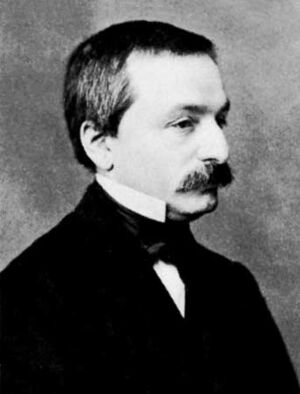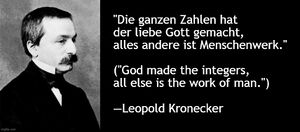Leopold Kronecker (nonfiction): Difference between revisions
No edit summary |
No edit summary |
||
| (9 intermediate revisions by the same user not shown) | |||
| Line 1: | Line 1: | ||
[[File:Leopold_Kronecker_1865.jpg|thumb|Leopold Kronecker (1865).]]'''Leopold Kronecker''' (7 December 1823 – 29 December 1891) was a German mathematician who worked on number theory, algebra, and logic. | [[File:Leopold_Kronecker_1865.jpg|thumb|Leopold Kronecker (1865).]][[File:God made the integers, all else is the work of man.jpg|thumb|"Die ganzen Zahlen hat der liebe Gott gemacht, alles andere ist Menschenwerk." ("God made the integers, all else is the work of man.") —Leopold Kronecker]]'''Leopold Kronecker''' (7 December 1823 – 29 December 1891) was a German mathematician who worked on number theory, algebra, and logic. | ||
He criticized [[Georg Cantor (nonfiction)|Cantor]]'s work on [[Set theory (nonfiction)|set theory]]. | He criticized [[Georg Cantor (nonfiction)|Cantor]]'s work on [[Set theory (nonfiction)|set theory]]. | ||
Kronecker was quoted by [[Heinrich Martin Weber (nonfiction)|Weber]] (1893) as having said, "Die ganzen Zahlen hat der liebe Gott gemacht, alles andere ist Menschenwerk" ("God made the integers, all else is the work of man."). | Kronecker was quoted by [[Heinrich Martin Weber (nonfiction)|Heinrich Martin Weber]] (1893) as having said, "Die ganzen Zahlen hat der liebe Gott gemacht, alles andere ist Menschenwerk" ("God made the integers, all else is the work of man."). | ||
Kronecker was a student and lifelong friend of [[Ernst Kummer (nonfiction)|Ernst Kummer]]. | Kronecker was a student and lifelong friend of [[Ernst Kummer (nonfiction)|Ernst Kummer]]. | ||
Leopold Kronecker was born on 7 December 1823 in Liegnitz, Prussia (now Legnica, Poland) in a wealthy Jewish family. His parents, Isidor and Johanna (née Prausnitzep), took care of their children's education and provided them with private tutoring at home – Leopold's younger brother Hugo Kronecker would also follow a scientific path, later becoming a notable physiologist. Kronecker then went to the Liegnitz Gymnasium where he was interested in a wide range of topics including science, history and philosophy, while also practicing gymnastics and swimming. At the gymnasium he was taught by [[Ernst Kummer (nonfiction)|Ernst Kummer]], who noticed and encouraged the boy's interest in mathematics. | |||
In 1841 Kronecker became a student at the University of Berlin where his interest did not immediately focus on mathematics, but rather spread over several subjects including astronomy and philosophy. He spent the summer of 1843 at the University of Bonn studying astronomy and 1843–44 at the University of Breslau following his former teacher [[Ernst Kummer (nonfiction)|Kummer]]. Back in Berlin, Kronecker studied mathematics with [[Peter Gustav Lejeune Dirichlet (nonfiction)|Peter Gustav Lejeune Dirichlet]] and in 1845 defended his dissertation in algebraic number theory written under [[Peter Gustav Lejeune Dirichlet (nonfiction)|Dirichlet]]'s supervision. | |||
After obtaining his degree, Kronecker did not follow his interest in research on an academic career path. He went back to his hometown to manage a large farming estate built up by his mother's uncle, a former banker. In 1848 he married his cousin Fanny Prausnitzer, and the couple had six children. For several years Kronecker focused on business, and although he continued to study mathematics as a hobby and corresponded with [[Ernst Kummer (nonfiction)|Kummer]], he published no mathematical results. In 1853 he wrote a memoir on the algebraic solvability of equations extending the work of [[Évariste Galois (nonfiction)|Évariste Galois]] on the theory of equations. | |||
Due to his business activity, Kronecker was financially comfortable, and thus he could return to Berlin in 1855 to pursue mathematics as a private scholar. [[Peter Gustav Lejeune Dirichlet (nonfiction)|Dirichlet]], whose wife Rebecka came from the wealthy Mendelssohn family, had introduced Kronecker to the Berlin elite. He became a close friend of [[Karl Weierstrass (nonfiction)|Karl Weierstrass]], who had recently joined the university, and his former teacher [[Ernst Kummer (nonfiction)|Kummer]] who had just taken over [[Peter Gustav Lejeune Dirichlet (nonfiction)|Dirichlet]]'s mathematics chair. Over the following years Kronecker published numerous papers resulting from his previous years' independent research. As a result of this published research, he was elected a member of the Berlin Academy in 1861. | |||
Although he held no official university position, Kronecker had the right as a member of the Academy to hold classes at the University of Berlin and he decided to do so, starting in 1862. In 1866, when Riemann died, Kronecker was offered the mathematics chair at the University of Göttingen (previously held by [[Carl Friedrich Gauss (nonfiction)|Carl Gauss]] and [[Peter Gustav Lejeune Dirichlet (nonfiction)|Dirichlet]]), but he refused, preferring to keep his position at the Academy. Only in 1883, when [[Ernst Kummer (nonfiction)|Kummer]] retired from the University, was Kronecker invited to succeed him and became an ordinary professor. Kronecker was the supervisor of [[Kurt Hensel (nonfiction)|Kurt Hensel]], [[Adolf Kneser (nonfiction)|Adolf Kneser]], [[Mathias Lerch (nonfiction)|Mathias Lerch]], and [[Franz Mertens (nonfiction)|Franz Mertens]], amongst others. | |||
His philosophical view of mathematics put him in conflict with several mathematicians over the years, notably straining his relationship with [[Karl Weierstrass (nonfiction)|Weierstrass]], who almost decided to leave the University in 1888. | |||
Kronecker died on 29 December 1891 in Berlin, several months after the death of his wife. In the last year of his life, he converted to Christianity. He is buried in the Alter St Matthäus Kirchhof cemetery in Berlin-Schöneberg, close to Gustav Kirchhoff. | |||
== In the News == | == In the News == | ||
| Line 14: | Line 28: | ||
== Fiction cross-reference == | == Fiction cross-reference == | ||
* [[Crimes against mathematical constants]] | |||
* [[Gnomon algorithm]] | |||
* [[Mathematics]] | * [[Mathematics]] | ||
== Nonfiction cross-reference == | == Nonfiction cross-reference == | ||
* [[Georg Cantor (nonfiction)]] | |||
* [[Johann Encke (nonfiction)]] - Doctoral advisor | |||
* [[Peter Gustav Lejeune Dirichlet (nonfiction)]] - Doctoral advisor | |||
* [[Évariste Galois (nonfiction)]] | |||
* [[God Created the Integers (nonfiction)]] - an anthology, edited by Stephen Hawking, of "excerpts from thirty-one of the most important works in the history of mathematics." The title of the book is a reference to Kronecker. | |||
* [[Kurt Hensel (nonfiction)]] - Doctoral student | |||
* [[Adolf Kneser (nonfiction)]] - Doctoral student | |||
* [[Ernst Kötter (nonfiction)]] - Doctoral student | |||
* [[Ernst Kummer (nonfiction)]] | * [[Ernst Kummer (nonfiction)]] | ||
* [[ | * [[Mathias Lerch (nonfiction)]] - Doctoral student | ||
* [[Mathematician (nonfiction)]] | * [[Mathematician (nonfiction)]] | ||
* [[Franz Mertens (nonfiction)]] - Doctoral student | |||
* [[Number theory (nonfiction)]] | * [[Number theory (nonfiction)]] | ||
* [[Paul Stäckel (nonfiction)]] - Doctoral student | |||
* [[Heinrich Martin Weber (nonfiction)]] | |||
* [[Karl Weierstrass (nonfiction)]] | |||
External links | == External links == | ||
* [https://en.wikipedia.org/wiki/Leopold_Kronecker Leopold Kronecker] @ Wikipedia | * [https://en.wikipedia.org/wiki/Leopold_Kronecker Leopold Kronecker] @ Wikipedia | ||
[[Category:Nonfiction (nonfiction)]] | [[Category:Nonfiction (nonfiction)]] | ||
[[Category:Leopold Kronecker (nonfiction)]] | |||
[[Category:Integers (nonfiction)]] | |||
[[Category:Mathematicians (nonfiction)]] | [[Category:Mathematicians (nonfiction)]] | ||
[[Category:Numbers (nonfiction)]] | |||
[[Category:Number theory (nonfiction)]] | [[Category:Number theory (nonfiction)]] | ||
[[Category:People (nonfiction)]] | [[Category:People (nonfiction)]] | ||
[[Category: (nonfiction)]] | |||
Latest revision as of 19:57, 13 January 2023
Leopold Kronecker (7 December 1823 – 29 December 1891) was a German mathematician who worked on number theory, algebra, and logic.
He criticized Cantor's work on set theory.
Kronecker was quoted by Heinrich Martin Weber (1893) as having said, "Die ganzen Zahlen hat der liebe Gott gemacht, alles andere ist Menschenwerk" ("God made the integers, all else is the work of man.").
Kronecker was a student and lifelong friend of Ernst Kummer.
Leopold Kronecker was born on 7 December 1823 in Liegnitz, Prussia (now Legnica, Poland) in a wealthy Jewish family. His parents, Isidor and Johanna (née Prausnitzep), took care of their children's education and provided them with private tutoring at home – Leopold's younger brother Hugo Kronecker would also follow a scientific path, later becoming a notable physiologist. Kronecker then went to the Liegnitz Gymnasium where he was interested in a wide range of topics including science, history and philosophy, while also practicing gymnastics and swimming. At the gymnasium he was taught by Ernst Kummer, who noticed and encouraged the boy's interest in mathematics.
In 1841 Kronecker became a student at the University of Berlin where his interest did not immediately focus on mathematics, but rather spread over several subjects including astronomy and philosophy. He spent the summer of 1843 at the University of Bonn studying astronomy and 1843–44 at the University of Breslau following his former teacher Kummer. Back in Berlin, Kronecker studied mathematics with Peter Gustav Lejeune Dirichlet and in 1845 defended his dissertation in algebraic number theory written under Dirichlet's supervision.
After obtaining his degree, Kronecker did not follow his interest in research on an academic career path. He went back to his hometown to manage a large farming estate built up by his mother's uncle, a former banker. In 1848 he married his cousin Fanny Prausnitzer, and the couple had six children. For several years Kronecker focused on business, and although he continued to study mathematics as a hobby and corresponded with Kummer, he published no mathematical results. In 1853 he wrote a memoir on the algebraic solvability of equations extending the work of Évariste Galois on the theory of equations.
Due to his business activity, Kronecker was financially comfortable, and thus he could return to Berlin in 1855 to pursue mathematics as a private scholar. Dirichlet, whose wife Rebecka came from the wealthy Mendelssohn family, had introduced Kronecker to the Berlin elite. He became a close friend of Karl Weierstrass, who had recently joined the university, and his former teacher Kummer who had just taken over Dirichlet's mathematics chair. Over the following years Kronecker published numerous papers resulting from his previous years' independent research. As a result of this published research, he was elected a member of the Berlin Academy in 1861.
Although he held no official university position, Kronecker had the right as a member of the Academy to hold classes at the University of Berlin and he decided to do so, starting in 1862. In 1866, when Riemann died, Kronecker was offered the mathematics chair at the University of Göttingen (previously held by Carl Gauss and Dirichlet), but he refused, preferring to keep his position at the Academy. Only in 1883, when Kummer retired from the University, was Kronecker invited to succeed him and became an ordinary professor. Kronecker was the supervisor of Kurt Hensel, Adolf Kneser, Mathias Lerch, and Franz Mertens, amongst others.
His philosophical view of mathematics put him in conflict with several mathematicians over the years, notably straining his relationship with Weierstrass, who almost decided to leave the University in 1888.
Kronecker died on 29 December 1891 in Berlin, several months after the death of his wife. In the last year of his life, he converted to Christianity. He is buried in the Alter St Matthäus Kirchhof cemetery in Berlin-Schöneberg, close to Gustav Kirchhoff.
In the News
Fiction cross-reference
Nonfiction cross-reference
- Georg Cantor (nonfiction)
- Johann Encke (nonfiction) - Doctoral advisor
- Peter Gustav Lejeune Dirichlet (nonfiction) - Doctoral advisor
- Évariste Galois (nonfiction)
- God Created the Integers (nonfiction) - an anthology, edited by Stephen Hawking, of "excerpts from thirty-one of the most important works in the history of mathematics." The title of the book is a reference to Kronecker.
- Kurt Hensel (nonfiction) - Doctoral student
- Adolf Kneser (nonfiction) - Doctoral student
- Ernst Kötter (nonfiction) - Doctoral student
- Ernst Kummer (nonfiction)
- Mathias Lerch (nonfiction) - Doctoral student
- Mathematician (nonfiction)
- Franz Mertens (nonfiction) - Doctoral student
- Number theory (nonfiction)
- Paul Stäckel (nonfiction) - Doctoral student
- Heinrich Martin Weber (nonfiction)
- Karl Weierstrass (nonfiction)
External links
- Leopold Kronecker @ Wikipedia

